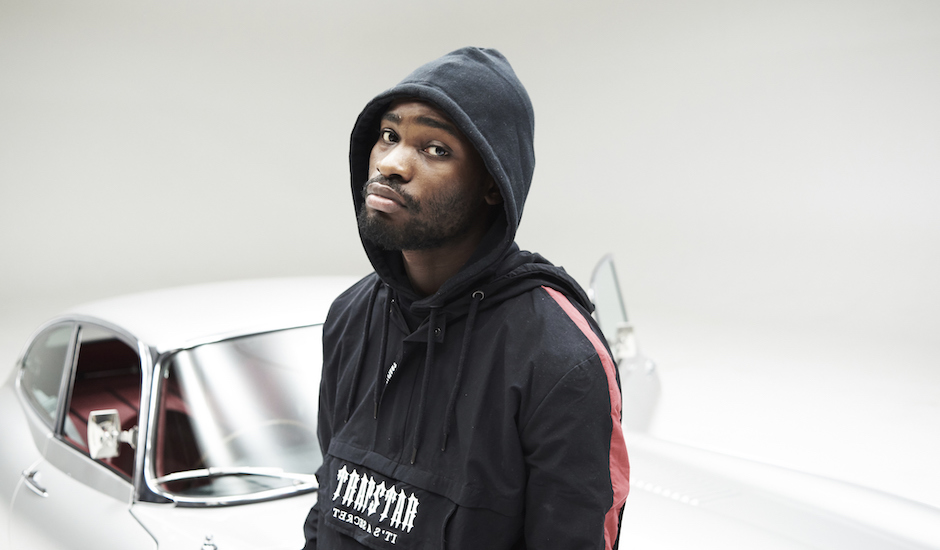 Meet Taj Ralph and his LUCIANBLOMKAMP-assisted new one, Kill The MoodThe quickly-rising Sydney musician is just another example of our rap scene's increasing strength.
Meet Taj Ralph and his LUCIANBLOMKAMP-assisted new one, Kill The MoodThe quickly-rising Sydney musician is just another example of our rap scene's increasing strength.

Rap, therapised: Inside the labyrinth of Dave’s opus, Psychodrama
Playing Splendour In The Grass this winter, the UK rapper has quickly established himself as one of the scene's best.
Header photo by Joe Magowan.
There are people you tell, and there are people you don’t.
It’s astounding that, even after all this time, the word ‘therapy’ carries with it a stigma. Traditionally, reaching out for help with ones mental health can be taken as an admission of weakness, an insurmountable red flag, or - at its most extreme - an allusion to insanity. It’s a characterisation that keeps the stressed and depressed from seeking help, a stereotype that dissuades those most in need from reaching out, a holdover from a time of Cuckoo Nest and behaviourist psychology.
Things are different now, and therapy is a useful tool for coming to grapple with one’s own issues and problems. A session as simple as discussing life with an impartial professional can help improve mental wellbeing, facilitate rational approaches and work through hardships. Most importantly, it opens us up to ourselves, giving us a better understanding of our personhood and fostering a more mindful approach to our lives. If you need a testimonial, you should turn to British-born emcee David Omoregie - call him Dave.
A newcomer in the strictest sense of the word, Psychodrama - Dave’s first LP - runs with a tightly honed craft and deft conceptual eye. The Streatham emcee uses skills sharpened over the last four years, in which time he’s released two acclaimed EPs and dropped a remix with Drake, to sketch one of the decades’ rawest character studies. Framed as the result of a year's worth of therapy sessions, Psychodrama takes the intimate setting of the psychologist's office and artistically weaponises it, making for a piece defined by disarming honesty and frank admissions.
It’s not a stylistic pivot as much as a long-gestating statement. Dave’s never shied away from implicating himself in his heady bars: Six Paths, the title track to his first EP, laments the risks and regrets that have shaped his present, while Picture Me finds the 17-year-old mulling over a handful of not-so-distant futures. The first person perspective thrusts the emcee into the centre of his stories, imbuing every aside with powerful insight. “I know exactly how I’m going to make it and what I need it to be,” he told NME in late 2017. “I just need to find the time.” Two months later, on the 23rd of January, Dave’s Psychodrama sessions begun.
The album finds this narrative device paired with some of Dave’s pithiest bars, which touch on racism, empowerment, intimacy, stress, violence and the transformative power of trauma. The eleven-track record is billed as a cross-sectional of a year of therapy, a lofty concept to distil to a brisk fifty minutes. The resultant storytelling is so efficient that it’s easy not to notice it at all. One moment you’re a critic, the next you’re caught up in his tightly-spun narratives and sombre reflections.
“Probably battlin' with manic depression,” he muses on Psycho, a track defined by the torrential release of pent up frustrations and insecurities. He worries that his girlfriend might find someone better, stresses about his legacy, admits to using sleep as anesthesia and grapples with the spectre of suicide. “I used to cry about my dad until my fucking eyes burnt,” he spits, alluding to the childhood abandonment that permeates throughout the rest of the record. It reads like the powerful culmination of a frantic story. It’s not. It’s the opening track.
It’s easy to imagine a cerebral, introspective rap record coming across as smug or lifeless, but Dave’s stories are irrevocably tied to his South London roots. Streatham explores the world in which he’s been raised, a hotbed of gangs, drugs and youth indifference. Dave’s experience also incorporates his Nigerian identity, and on Black, he channels afrocentricity while decrying the conditions in which minorities exist. Whether marginalised, persecuted or unduly judged, the Streatham emcee sees the pressures heaped upon his ignored and oft-vilified community.
Almost ten minutes into Psychodrama, we’re uncovering more about Dave than a cover story ever could. It’s his story on his terms, and it’s all the better for it - in regularly abandoning any strict sense of narrative storytelling, the young emcee spins honest vignettes that make way for his own raw reflections.
On Lesley, the records eleven-minute centrepiece, he meets a woman on the “9:06 from Norbury Station” in South London. What follows is a brutal second-hand account of her experience: Dave assembles her life from fragments of their conversation, piecing together the tortured life story of a relative stranger. Lesley’s more than just a subject - she’s an astoundingly three-dimensional portrait, complete with hopes, burdens and complicated relationships. Poverty, alienation and domestic violence are the horrors through which she suffers, and Dave’s evocative telling of her punishing story is nothing short of a call to arms. It’s direct and personal, and the outright implication of the listener hits like the final blow in a fistfight. He regales you with a crushingly bleak tale before hitting you with the question: how many people live this day to day? He knows the answer, and so do we.
Psychodrama isn’t easy listening, but it’s not as demanding as the themes suggest, buoyed by a host of producers including Dave himself and longtime collaborator and British music powerhouse Fraser T. Smith. Fragmented voices and tinkering pianos float atop the spacious instrumentals, sharp drum hits and trap rhythms punctuating his varied flows. The palette is spacey and atmospheric, giving his rhymes the spotlight they so deserve.
Dave starts six of the eleven tracks with “look,” and the same word opens eleven verses across the album. It’s both a stylistic signature and a friendly reminder to glance beyond the cursory and superficial, heeding the messages of his tracks and inspecting the ideas upon which we thoughtlessly rely.
In this way, he seamlessly spins the personal into greater messages, extrapolating lessons from his razor-sharp stories and delivering them without a hint of condescension. Psychodrama is an exceptional balancing act, a lean offering that puts each and every track to use building its own internal world. It’s Streatham through and through, but it touches on the universal, anchoring itself to the shared human experience.
“You can never stop learning about yourself,” proclaims the therapist at the end of “Lesley.” It’s a truth that Dave embraces on Psychodrama, and a reality we’d all be better off hearing.
Dave's debut album, Psychodrama, is out now via Neighbourhood Recordings / Caroline Australia. Catch him at Splendour In The Grass and headline shows in Sydney and Melbourne this July.
Follow DAVE: FACEBOOK
 Meet Taj Ralph and his LUCIANBLOMKAMP-assisted new one, Kill The MoodThe quickly-rising Sydney musician is just another example of our rap scene's increasing strength.
Meet Taj Ralph and his LUCIANBLOMKAMP-assisted new one, Kill The MoodThe quickly-rising Sydney musician is just another example of our rap scene's increasing strength.
 Introducing Nerve and his warning-shot new single, Big SwitchCatch the Brisbane rapper playing with Triple One on their east coast run of shows this June.
Introducing Nerve and his warning-shot new single, Big SwitchCatch the Brisbane rapper playing with Triple One on their east coast run of shows this June.